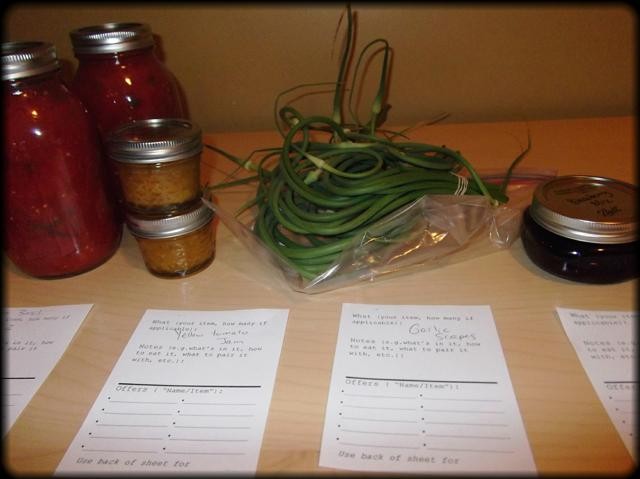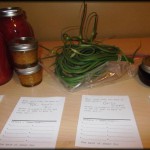- Canning meets camaraderie: Get to know your neighbors and share homemade creations at the inaugural West Asheville Food Swap.
- Beans galore: Baskets of green beans abound at farmers markets this month. Photo courtesy of ASAP
Swapping the surplus
If last season's jars of prized tomatoes are burning a hole on your canning shelf, the West Asheville Food Swap wants to make sure your carefully preserved goods don't go to waste. This new local initiative picks up on a national trend of neighbors exchanging homegrown goods with other aspiring and accomplished homesteaders.
A food swap is part marketplace and part silent auction. Participants spread out their homemade and homegrown goods on tables, then walk around the room to survey the bounty. When they find a jar of pickles, a half-dozen eggs or string of garlic that sparks their interest, they make their preferences known on a silent auction bid sheet. At the end of the afternoon, each homesteader reviews the offers and picks what they'd most like to swap. Individuals can decide what's a fair trade, and everyone ends up with a plethora of food to enjoy for the rest of the summer.
It's a mutual love of food that excites organizer Nellie Goetz, along with the community engagement that the swap inspires. "Like-minded people can connect, collaborate and form friendships that otherwise may not have existed," Goetz explains. "Spontaneous brainstorming and networking can spring up and allow people to exchange ideas."
The first West Asheville Food Swap will be held on Saturday, July 20, from 1-3 p.m. at the West Asheville Vineyard Community Center, 717 Haywood Road. Bring as many items as you'd like to exchange and remember: The more you bring, the more you can take home. Only 25 spots are available for this first swap, so advance registration is required for this free event. To sign up, go to http://wavlfoodswap.com.
30 years of native plants
Back in 1984, a group of plant enthusiasts came together to honor our region's flora. They exchanged ideas, fostered new projects and formed the bedrock of the Cullowhee Native Plant Conference. This year, the gathering will celebrate its third decade of exploring new and traditional ways to propagate and preserve Southeastern plants.
“This meeting stresses the pivotal role that plants play in conservation of the land and water resources on which human life depends,” says Robert Wyatt, conference director and retired professor of botany and ecology at the University of Georgia. "It focuses on increasing people’s appreciation of the beauty of natural plant communities and native plant species.”
This year's keynote speakers include Douglas Tallamy, author of Bringing Nature Home: How You Can Sustain Wildlife With Native Plants. He will speak about using our region's shrubs, plants and flowers to improve curb appeal. Author Janisse Ray will recount her early years in rural Georgia and her passion for the area's vanishing longleaf pine forests.
The conference will be held at Western Carolina University on Wednesday, July 17, through Saturday, July 20. The registration fee is $125. Optional field trips are available for $75, and a home gardening session will be offered for $25 on Saturday. Info and registration: http://avl.mx/v4.






Before you comment
The comments section is here to provide a platform for civil dialogue on the issues we face together as a local community. Xpress is committed to offering this platform for all voices, but when the tone of the discussion gets nasty or strays off topic, we believe many people choose not to participate. Xpress editors are determined to moderate comments to ensure a constructive interchange is maintained. All comments judged not to be in keeping with the spirit of civil discourse will be removed and repeat violators will be banned. See here for our terms of service. Thank you for being part of this effort to promote respectful discussion.